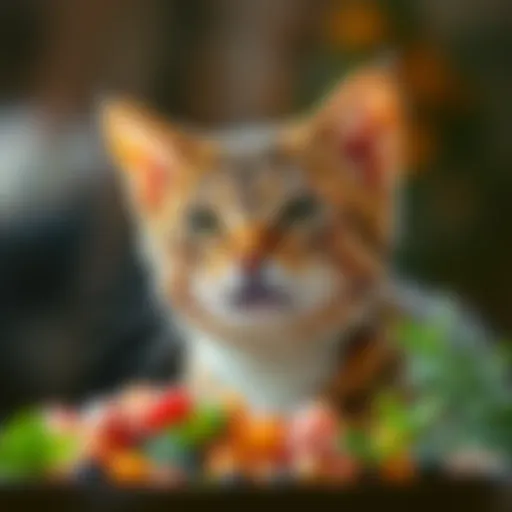Unlock the Ultimate Sugar Glider Food List for Complete Nutrition
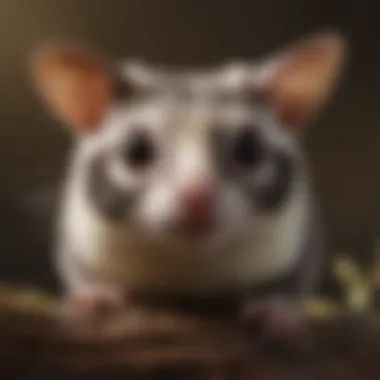

Animal Species Profile
Within the world of exotic pets, sugar gliders stand out with their distinctive charm and unique care requirements. These small marsupials, known scientifically as Petaurus breviceps, have captured the hearts of many animal enthusiasts.
Physical Characteristics and Appearance
Sugar gliders possess a furry membrane that allows them to glide through the air, resembling miniature versions of flying squirrels. Sporting a set of large eyes, gentle faces, and a membrane that runs from their wrists to their ankles, these creatures are truly a sight to behold.
Natural Habitat and Distribution
Originating from the forests of Australia, Indonesia, and Papua New Guinea, sugar gliders thrive in dense woodlands where they can leap and glide effortlessly from tree to tree. Their natural habitat provides ample opportunities for foraging, socializing, and displaying their natural behaviors.
Behavior and Social Interactions
Despite their diminutive size, sugar gliders are highly social animals that form close bonds within their colonies. They communicate through a combination of vocalizations, scent markings, and body language, displaying complex social structures and a strong sense of communal living.
Introduction to Sugar Gliders
In this article, we delve into the world of sugar gliders, small marsupials known for their adorable nature and unique dietary requirements. Understanding the dietary needs of sugar gliders is crucial for ensuring their health and well-being. By crafting a well-rounded diet tailored to their specific needs, we can enhance their vitality and longevity. Sugar gliders are fascinating creatures with distinct dietary preferences, making it essential to explore various food options that cater to their nutritional requirements.
Understanding Sugar Gliders' Dietary Needs
High-Protein Requirements
High-protein requirements play a vital role in the diet of sugar gliders, promoting muscle development and overall growth. Protein is crucial for their energy levels and supports various biological functions. By incorporating protein-rich foods into their diet, we can ensure that sugar gliders maintain optimal health and vitality. Mealworms and grubs are excellent sources of protein for sugar gliders, offering a range of essential nutrients that contribute to their well-being.
Varied and Balanced Diet
Providing sugar gliders with a varied and balanced diet is key to meeting their diverse nutritional needs. A diet that includes a mix of protein sources, fresh fruits, and vegetables ensures that sugar gliders receive all the essential vitamins and minerals for their health. By offering a balanced diet, we can prevent nutritional deficiencies and promote overall wellness in these unique animals.
Incorporating Essential Nutrients
Incorporating essential nutrients into the diet of sugar gliders is crucial for supporting their metabolic functions and immune system. Essential nutrients such as vitamins and minerals play a significant role in maintaining their health and ensuring proper growth. By integrating a variety of nutrient-rich foods into their diet, we can meet their dietary requirements and help them thrive.
Factors Influencing Food Choices
Natural Habitat
The natural habitat of sugar gliders influences their food choices, as their diet in the wild consists of a variety of insects, fruits, and sap. Understanding their natural habitat helps us replicate a similar diet in captivity, ensuring that they receive the necessary nutrients for their well-being. By mimicking their natural food sources, we can provide a diet that aligns with their biological needs.
Metabolic Rate
The metabolic rate of sugar gliders plays a crucial role in determining their dietary requirements and energy levels. These energetic creatures have high metabolic rates, requiring a diet that is rich in nutrients and energy. By considering their metabolic rate, we can tailor their diet to meet their energy demands and support their active lifestyle.
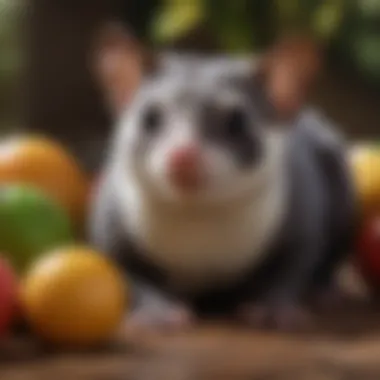

Age and Health Conditions
The age and health conditions of sugar gliders impact their dietary needs, with younger gliders requiring more protein and nutrients for growth and development. Older gliders or those with specific health conditions may have different dietary requirements that need to be taken into consideration. By understanding the nutritional needs of sugar gliders at different life stages, we can ensure that they receive the appropriate diet for optimal health.
Protein-Rich Foods for Sugar Gliders
When delving into the realm of sugar glider nutrition, the emphasis on protein-rich foods is paramount. These small marsupials have high protein requirements to maintain their energy levels and overall health. Protein serves as a crucial building block for muscle development, immune function, and essential metabolic processes. Ensuring that sugar gliders have a well-rounded diet that includes adequate protein sources is fundamental to their well-being.
Mealworms and Grubs
Nutritional Benefits
Mealworms and grubs are rich sources of protein, essential for the growth and sustenance of sugar gliders. Their nutritional composition provides a significant amount of protein that aids in muscle development and overall health. Additionally, they offer essential nutrients like vitamins and minerals, contributing to a balanced diet for sugar gliders. The digestibility of these insects makes them a popular and beneficial choice in enhancing the protein intake of sugar gliders.
Feeding Guidelines
Feeding mealworms and grubs to sugar gliders should be done in moderation to prevent nutritional imbalances. These insects can be fed live, dried, or powdered, offering flexibility in incorporating them into the glider's diet. It is essential to ensure the freshness and quality of the mealworms to avoid any potential health issues. Providing a varied diet that includes mealworms and grubs can significantly enhance the protein content and nutritional value, promoting the overall health of sugar gliders.
Boiled Eggs
Protein Content
Boiled eggs are prized for their high protein content, making them an excellent addition to a sugar glider's diet. The protein derived from eggs is easily digestible and serves as a valuable source for muscle development and repair. Including boiled eggs in their meals ensures that sugar gliders receive a sufficient amount of protein essential for their growth and vitality.
Preparation Tips
Boiling eggs for sugar gliders should be done without the addition of salt or seasoning to maintain their nutritional integrity. Eggs should be hard-boiled and chopped into small, manageable pieces for the gliders to consume easily. It is advisable to offer eggs as a periodic treat rather than a staple, balancing their diet with other protein sources for dietary variety and optimal nutrition.
Lean Meats
Iron and Protein Sources
Lean meats such as chicken and turkey serve as valuable sources of both iron and protein for sugar gliders. Iron is essential for oxygen transport in the bloodstream, while protein aids in tissue repair and growth. Including lean meats in their diet provides a well-rounded nutritional profile, supporting their overall health and vitality.
Suitable Meat Options
When selecting lean meats for sugar gliders, it is crucial to choose options with low fat content to prevent digestive issues. Avoiding seasoned or processed meats is advisable to ensure that sugar gliders receive only the essential nutrients without additives or preservatives. Offering lean meats in small, controlled portions allows sugar gliders to benefit from the protein and iron content without compromising their dietary balance.
Fresh Fruits and Vegetables for Balanced Nutrition
In this section dedicated to fresh fruits and vegetables for balanced nutrition in sugar gliders, we delve into the pivotal role of these dietary components in ensuring optimal health and vitality for our marsupial companions. Fresh fruits and vegetables offer a spectrum of essential vitamins, minerals, and antioxidants crucial for supporting overall well-being. By incorporating a variety of these plant-based foods into their diet, sugar gliders can receive a well-rounded nutritional intake.
Apple Slices and Grapes
Vitamin Content
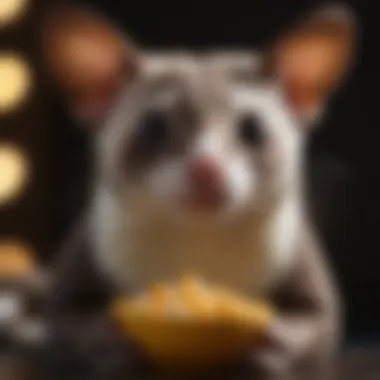

When it comes to the vitamin C content in apple slices and grapes, we are looking at a significant nutritional boon for sugar gliders. Vitamin C plays a vital role in boosting their immune system, promoting healthy skin, and aiding in wound healing. The presence of this antioxidant in fruits like apples and grapes contributes to the overall well-being of sugar gliders, keeping them vibrant and robust. However, it is important to note that excessive vitamin C intake may lead to certain health complications; hence, moderation is key to reaping the benefits of this essential nutrient.
Small Bite-Sized Portions
The concept of offering small bite-sized portions of fruits like apple slices and grapes to sugar gliders has several advantages. These tiny pieces make it easier for the gliders to consume and enjoy their meal without struggling with large chunks of food. Additionally, providing fruits in small portions helps prevent overeating, ensuring that the sugar gliders maintain a balanced diet. However, it is essential to monitor the quantity of fruits offered to prevent fits of frugivorous gluttony, which could upset their dietary equilibrium and lead to potential health issues.
Leafy Greens
Calcium-Rich Options
Leafy greens stand out as calcium-rich options that provide vital support for sugar gliders' bone health and muscular functions. Incorporating leafy greens such as kale, collard greens, and spinach into their diet helps fulfill their calcium requirements, essential for strong bones and teeth. This mineral is indispensable, particularly for young growing gliders and lactating mothers, ensuring optimal skeletal development in the former and calcium replenishment in the latter.
Variety and Rotation
The rotation and variety of leafy greens in sugar gliders' diet introduce a spectrum of nutrients and flavors, preventing monotony and providing a diverse nutritional profile. By offering a rotation of leafy greens such as arugula, Swiss chard, and bok choy, one can ensure that sugar gliders receive a broad spectrum of essential vitamins and minerals. This dietary approach not only caters to their nutritional needs but also keeps mealtime interesting, encouraging healthy eating habits in these delightful creatures.
Carrots and Sweet Potatoes
Beta-Carotene Benefits
Carrots and sweet potatoes offer a valuable source of beta-carotene, a precursor to vitamin A essential for maintaining good eyesight and promoting healthy skin and coat in sugar gliders. These orange-hued vegetables contribute to the marsupials' overall health by providing antioxidant protection and supporting immune function. However, it is crucial to moderate the intake of these beta-carotene-rich foods to avoid overconsumption, as excessively high levels can lead to health complications such as carotenosis.
Moderation in Serving Sizes
Emphasizing moderation in serving sizes when offering carrots and sweet potatoes to sugar gliders is paramount to maintaining a balanced diet. While these vegetables offer essential nutrients, including fiber and vitamin A precursors, excessive consumption can result in digestive issues or unnecessary caloric intake. By serving these foods in controlled portions, sugar gliders can benefit from their nutritional value without experiencing any adverse effects on their health and well-being.
Supplements and Treats for Added Nutritional Support
When it comes to ensuring optimal nutrition for sugar gliders, supplements and treats play a vital role in their diet. These additions provide necessary nutrients and variety to promote overall health and well-being for these adorable marsupials. By incorporating supplements and treats into their meals, sugar gliders can have a more balanced and complete nutritional intake.
Calcium Powder
Ensuring Bone Health
Ensuring proper bone health is crucial for sugar gliders, as it supports their skeletal structure and overall mobility. Calcium powder, a key component in maintaining bone strength, is essential for these tiny creatures. Its role in fortifying bones helps sugar gliders stay active and healthy, preventing bone-related issues that could affect their quality of life. By including calcium powder in their diet, sugar gliders can maintain optimal bone density and overall well-being.
Recommended Dosage
Determining the recommended dosage of calcium powder is paramount to the health of sugar gliders. A balanced intake of this supplement ensures that these creatures receive adequate amounts of calcium without overloading their systems. By following veterinary guidelines on dosage and frequency, sugar glider owners can provide their pets with the right amount of calcium for optimal health. Monitoring the dosage of calcium powder is essential to prevent any potential imbalances or health complications, safeguarding the well-being of these marsupials.
Meal Replacement Powders
Convenient Nutritional Boost
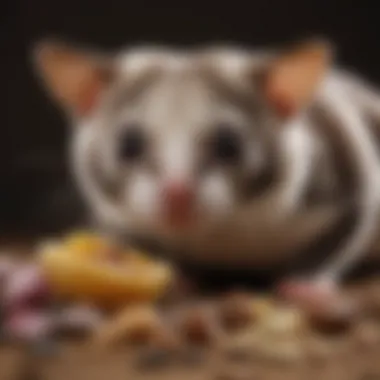

Meal replacement powders offer a convenient way to enhance the nutritional content of sugar gliders' diets. These supplements provide a concentrated source of essential nutrients in a convenient form, ensuring that sugar gliders receive a well-rounded diet. With busy schedules or limited access to fresh foods, integrating meal replacement powders can help maintain the necessary nutritional balance for these creatures. Their easy application and nutrient-rich composition make them a practical choice for supporting sugar gliders' overall health.
Integrating into Diet
Integrating meal replacement powders into the diet of sugar gliders is a seamless process that can significantly benefit their nutritional intake. By mixing these powders with their regular meals or snacks, sugar glider owners can ensure that their pets receive a diverse range of nutrients essential for their well-being. The flexibility of incorporating meal replacement powders into different food types allows for versatile feeding options, catering to the specific dietary needs of sugar gliders. With careful integration, these powders can enhance the overall nutritional value of their diet.
Dried Fruits as Occasional Treats
Energy-Rich Snacking
Dried fruits serve as energy-rich snacks for sugar gliders, offering a tasty and nutritious treat option. These treats provide a quick energy boost while also satisfying their craving for something sweet. The natural sugars present in dried fruits can give sugar gliders a burst of energy, making them ideal for occasional indulgences or rewards. By incorporating these treats into their diet sparingly, sugar gliders can enjoy a flavorful snack that complements their overall nutrition.
Limiting Sugary Content
While dried fruits offer energy and flavor, it is essential to moderate their intake to limit the sugary content in sugar gliders' diet. Excessive sugar consumption can lead to health issues such as obesity or dental problems in these tiny creatures. By offering dried fruits as occasional treats and controlling the portion sizes, sugar glider owners can prevent any negative effects of high sugar intake. Balancing the inclusion of dried fruits with their regular diet helps maintain a healthy eating pattern for sugar gliders, ensuring their well-being and vitality.
Choosing Suitable Commercial Diets
Choosing suitable commercial diets is a critical aspect when it comes to providing optimal nutrition for sugar gliders. These diets play a significant role in ensuring that sugar gliders receive essential nutrients required for their overall health and well-being. Commercial diets are formulated to meet the specific dietary needs of sugar gliders, providing a convenient and balanced option for pet owners. By incorporating commercial diets into their meal plans, sugar gliders can benefit from a comprehensive source of vitamins, minerals, and other key nutrients necessary for their development.
Reading Nutritional Labels
Identifying Essential Components
One crucial aspect of reading nutritional labels for sugar gliders is identifying essential components within the commercial diet. This step is vital as it allows pet owners to ensure that the diet meets the specific nutritional requirements of sugar gliders. Essential components such as protein, vitamins, and minerals are key factors to consider when selecting a commercial diet. By understanding the significance of these components, pet owners can make informed decisions about which commercial diets are most suitable for their sugar gliders.
Avoiding Harmful Additives
Another important consideration when reading nutritional labels is avoiding harmful additives that may be present in certain commercial diets. Harmful additives can have adverse effects on the health of sugar gliders, potentially leading to nutritional imbalances or other health issues. By carefully examining the ingredients list and avoiding harmful additives such as artificial preservatives or excessive sugars, pet owners can safeguard the well-being of their sugar gliders and ensure they are receiving a wholesome and balanced diet.
Consulting with Veterinarians
Professional Dietary Recommendations
Consulting with veterinarians for professional dietary recommendations can offer valuable insights into creating an optimal nutrition plan for sugar gliders. Veterinarians possess the expertise and knowledge to recommend suitable commercial diets based on the individual needs and health conditions of sugar gliders. Their professional guidance can help pet owners make informed decisions regarding the selection of commercial diets that align with the dietary requirements of sugar gliders.
Customizing Diet Plans
Veterinarians can also assist in customizing diet plans tailored to the specific nutritional needs of sugar gliders. Customized diet plans take into account factors such as the age, activity level, and health conditions of sugar gliders to ensure they are receiving a diet that optimizes their health and well-being. By collaborating with veterinarians to create personalized diet plans, pet owners can enhance the overall nutritional quality of their sugar gliders' diets, promoting longevity and vitality.
Conclusion
Ensuring Optimal Nutrition for Sugar Gliders
Balanced Diet Importance
A balanced diet is a cornerstone in the care of sugar gliders, ensuring they receive all the necessary nutrients for good health. By incorporating a variety of protein sources, fresh fruits, vegetables, and supplements, sugar gliders can maintain their energy levels, immune function, and overall vitality. Offering a balanced diet helps in preventing nutritional deficiencies and promoting a healthy weight, essential for their longevity and well-being. This approach is favored for its ability to meet the intricate dietary needs of sugar gliders, safeguarding them against health issues and ensuring a robust immune system, characteristic of a well-cared-for pet.
Health and Behavior Benefits
Providing optimal nutrition to sugar gliders has a ripple effect on their health and behavior. A diet rich in essential nutrients not only sustains their physical well-being but also influences their behavior positively. Sugar gliders on a nutritionally balanced diet exhibit more active and social behaviors, showcasing their natural instincts and interactive nature. Moreover, a well-fed sugar glider is less likely to develop health problems such as obesity, diabetes, or dental issues, improving their quality of life significantly. This section has highlighted how prioritizing their nutritional needs results in a healthier, happier sugar glider, fostering a deep bond between pet and owner.







